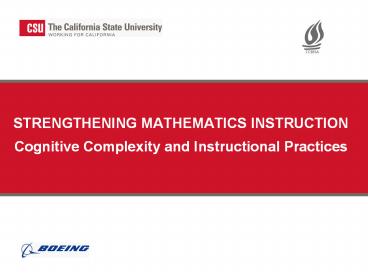STRENGTHENING MATHEMATICS INSTRUCTION Cognitive Complexity and Instructional Practices - PowerPoint PPT Presentation
1 / 12
Title:
STRENGTHENING MATHEMATICS INSTRUCTION Cognitive Complexity and Instructional Practices
Description:
Cognitive Complexity and Instructional Practices * Instructor s Notes: Depending on when this module is presented, you may want to revisit the group meeting norms ... – PowerPoint PPT presentation
Number of Views:338
Avg rating:3.0/5.0
Title: STRENGTHENING MATHEMATICS INSTRUCTION Cognitive Complexity and Instructional Practices
1
STRENGTHENING MATHEMATICS INSTRUCTIONCognitive
Complexity and Instructional Practices
2
Characteristics of the Workshop
- 18-24 hours of professional development 8
modules to allow for flexibility in scheduling - Standards based and tied to the CSTs and CSU
placement standards - Includes content and activities for teachers of
Algebra 1 Geometry, Algebra 2, Pre-Calculus - Draws on problems and lessons from the major
textbooks - Designed for teacher practice and implementation
between workshop sessions based on lesson study
model - Reflective of the recently adopted national
mathematics standards - No cost to the school(s) for workshop and
materials
3
Workshop Outcomes
- Identify instructional strategies that will help
students organize and solidify conceptual
understanding - Identify characteristics of cognitively complex
problems - Locate standards-based cognitively complex
problems within participants classroom texts - Modify standards-based textbook problems to
increase the level of cognitive complexity - Practice writing standards-based cognitively
complex problems - Experience the varying roles in the
teacher/learner continuum - Model a variety of student engagement strategies
4
Why?
What are some of the causes that lead to students
being confused about mathematical concepts and
content?
confused students
5
Cognitively Complex Problems
These types of problems require students to
- Extend previously encountered tasks
- Integrate several topics and/or concepts
- Recognize and use underlying mathematical
structures - Use multiple representations
- Consider multiple approaches to the problem
- Identify patterns
- Be flexible and strategic in their mathematical
thinking
6
Causes of Low Proficiency Levels
Activity
- Think about things that you believe contribute to
low proficiency levels in students work. - Write each idea on a separate post-it note.
7
Example 3 The Real Numbers
Arrange the numbers in increasing order from
smallest to largest
If 0 lt x lt 1, arrange the terms in increasing
numerical order from smallest to largest
8
Locating Cognitively Complex Problems
Activity
- Choose a section or chapter in your textbook that
you will be teaching in the next few weeks. - Use post-it notes to indicate any problems that
are cognitively complex. - At your table, discuss the following questions
- Where did you find these problems?
- Compare the number of complex problems to the
number of standard problems in your textbook. - How often do you assign these problems for
homework? - How often do you include these problems in your
section/chapter assessments?
9
Geometry Extension 3 (Problem)
- A square is inscribed in a circle of radius 3
units. What is the total area enclosed within
the circle but outside the square?
A circle of radius 3 units is inscribed in an
equilateral triangle. Find the length of the side
of the triangle.
10
Motivating and Making Sense of Definitions
The Context
11
Its Your Turn to Identify Structures!
Partner Up with someone you havent worked with
before.
- Discuss
- Have I provided my students with these types of
problems? If not, why? - How would I begin to incorporate more of these
types of problems in my teaching? - What are some challenges I might face in
developing these types of problems?
- Using the activity page
- Determine the basic structure for each of the
problems. - Determine which problems were easier and harder
for you and why. - Share your AHAs with each other.
12
What teachers said about a pilot workshop
- It gave me a starting point to improve
instruction - Working with my fellow teachers and having time
- to explore complexity was most valuable
- Learning about cognitive layering in problems is
- very important
- I learned to ask more open-ended questions and
- use what if to explore mathematical ideas
- without fear
- This workshop showed me strategies to help
- students think mathematically































